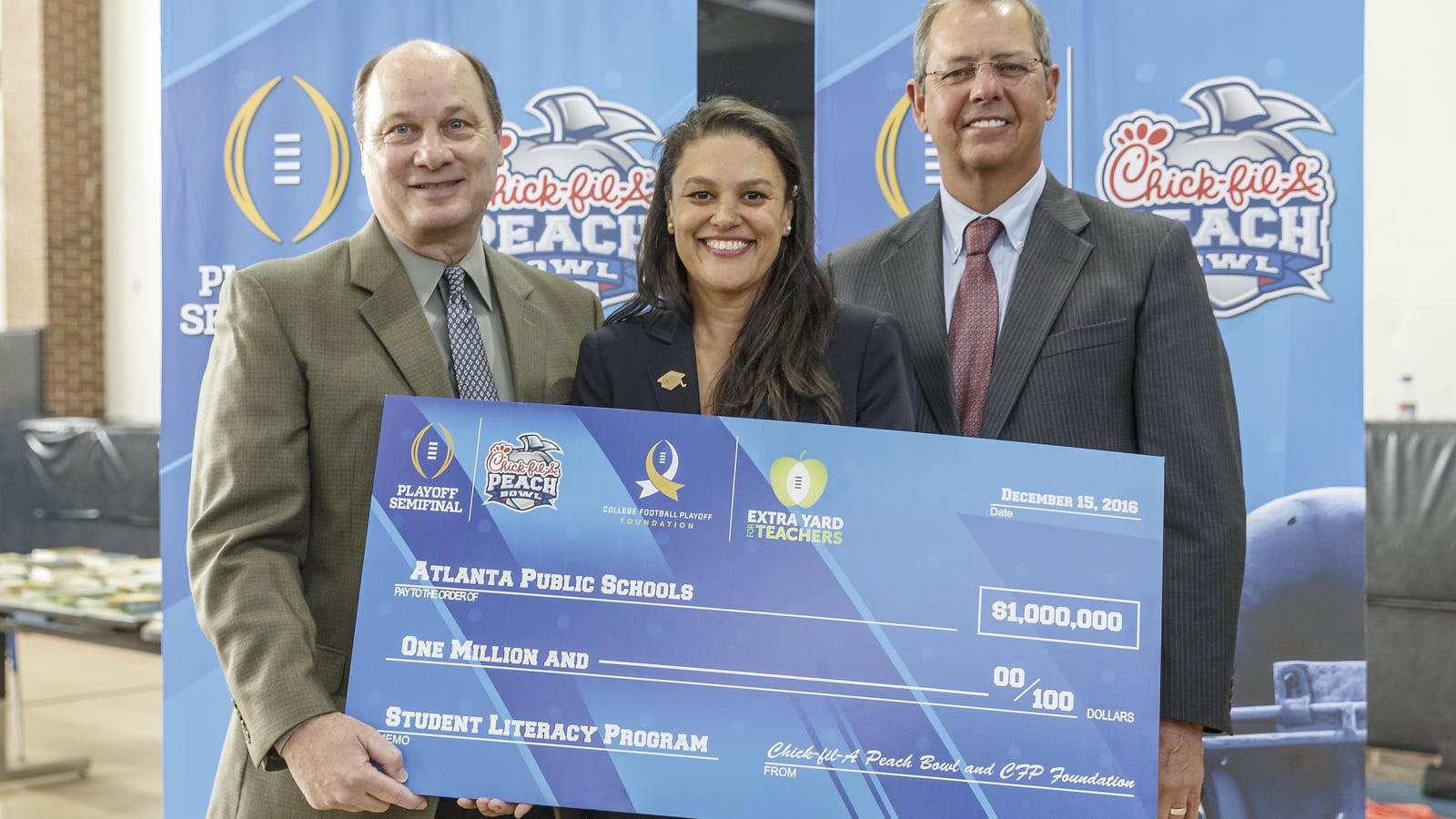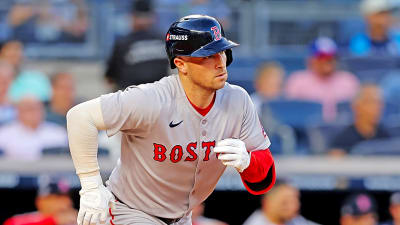
Making of the Peach Bowl: A look inside this year's CFB Playoff semifinal prep
Every single bowl game, whether it’s a shoehorned corporate outfit with a clunky name or a blue-blood, "traditional" one, tries to market itself around pageantry, philanthropy, pride or some combination of the three. Yet, very few of them have been able to meld the three together in such a way that they have claimed prime real estate in the hearts and minds of college football fans around the nation.
In that elite class live hard-working men and women who put in nearly a year of preparation for their events. The Chick-fil-A Peach Bowl, college football’s ninth-oldest bowl game, is not only a game with rich history, but one that happens to be the biggest annual show in Atlanta that isn’t a Super Bowl. In less than two weeks, the 2016 edition enters rarefied territory as it takes its turn in the national semifinal rotation as part of the College Football Playoff.
To fully understand what it takes to put together the Peach Bowl, you have to go back to 1985, when the game nearly went out of business after less than 20 years. When the Metro Atlanta Chamber of Commerce took control of the game, the city’s business community stepped up in support. Delta Airlines wrote the first check for $100,000 and purchased over 3,000 tickets to help kick-start the turnaround. In speaking to the game’s significance to the city, Peach Bowl CEO Gary Stokan, who has held the post since 1998, told Yardbarker that the growth in sponsorships “elevated our game to the business community. So now, we have the likes of Coca-Cola, Home Depot, Chick-fil-A, all Fortune 500, Atlanta-based companies who are sponsoring our game.” It also helped that Atlanta is the third-largest convention city in the U.S. behind Las Vegas and Chicago.
About a decade later in 1996, Chick-fil-A became the title sponsor, and the game had a 17-year sellout streak — second to the Rose Bowl in Pasadena – thanks to huge fan support. In 2014, “Peach” returned to the bowl’s name — the game was called the Chick-fil-A Bowl until 2013 — along with something else: a place among the elite as one of the rotating hosts of the College Football Playoff along with the Fiesta, Cotton, Sugar, Rose and Orange Bowls.
So in 2016, the Peach Bowl experience is more than just a single game, albeit a competitive one of some of the top teams in the country. It’s a year-round effort to not only prepare for the game itself, but to raise scholarship money and find other ways to celebrate the spirit of competition.
Case in point, there’s a great coaches event every spring called the Chick-fil-A Peach Bowl Challenge, which pits NCAA coaches with famed former athletes of the same school to win a share of over a half-million dollars of scholarship and charitable donations in a golf tournament. It’s a rare opportunity for Peach Bowl organizers to connect with athletic directors and coaches whose teams could potentially play in either the Peach Bowl itself or the Chick-fil-A Kickoff Game, which the committee puts together for Labor Day weekend. It’s also a chance to bring along coaches who may have never played in the bowl game, such as retired coaches Steve Spurrier and Frank Beamer, or even Urban Meyer, who will lead the third-ranked Ohio State Buckeyes into the Fiesta Bowl, this year’s second semifinal game, against Clemson.
This spring, Ole Miss head coach Hugh Freeze and former tight end Wesley Walls won the top prize of $100,000, combining for 11-under par.
“The unique thing about it is that you get these coaches together who are so busy and their time is so valuable, and you create a unique atmosphere for them for a few days,” reflected David Epps, COO and vice president of marketing for the Peach Bowl, who has been part of the game for over 20 years. “They get to spend time with their peers, they can relax and they can compete, which is what they love to do.”
The latter part is true as Georgia Tech’s Paul Johnson and hoops alumnus Jon Barry have won four tournaments while coming in second this year.
“Those guys are excellent golfers,” said Epps. “There’s no doubt that every year, the targets are on their backs, and it was quite a tournament this year.”
Immediately after the tournament, the coaches head right back to work as well as the bowl organizers themselves. Since the first day of the season, the small team of about 14 staffers and their partners tracked the social media and digital footprints of the road teams in order to get a sense of who may come to Atlanta in December and what matters in terms of the fan experience. When top-ranked Alabama and fourth-ranked Washington were selected, the Peach Bowl team was off and running in communicating to season ticket holders and other interested fans on exactly what will happen in Atlanta when they arrive. From customized greetings at the airport to signage along the highways, the Crimson Tide and Huskies will be given warm welcomes into the city.
The experience extends to the official team hotels where fans also stay. On the day before the game, there’s approximately a four-hour block in which 80 percent of the fans check in to their hotels, a normally mundane experience turned exhausting when coming to town for a big event. To spruce things up, the lobbies of both hotels are turned into mini fan festivals with music, food, face painting, merchandise, and even the cheerleaders and marching bands of the teams, all free add-ons for the arriving fans.
In addition to special deals to draw these fans to their establishments, restaurants throughout downtown Atlanta take part in "Gridiron Grub," creating dishes loosely inspired by the culture of college football.
Fans will also enjoy the Game Day Parade, which runs through Centennial Olympic Park in downtown Atlanta, the individual teams and marching bands walk toward the Georgia World Congress Center and the biggest fan event, the Game Day Fan Fest. About 35,000 people will take part in the festivities, which will include team rallies of sorts as both Alabama and Washington join in to greet the fans one last time before the game itself.

Getting support for the Peach Bowl means getting the entire community involved, down to Yang Yang's help at Zoo Atlanta for the Chick-fil-A Peach Bowl Panda Pick ‘Em.
“Ultimately, whether a team wins or loses, you want that fan to be able to say, ‘The experience was worth it; I got my money’s worth,” Epps said. “We know these fans are making a decision to spend thousands of dollars when they could have renovated their basement or purchased an 80-inch flat panel TV.”
And because of those decisions to make the journey to Atlanta, the fan experience is also a huge reason why the Peach Bowl will give $1.7 million in charitable and scholarship donations this year. In reference to the sellout streak, Stokan said, “The fans bought the tickets, so the fans supported the game, and that’s why we’ve given $21 million back to the community since 2002 because the community made this bowl.”
For the game itself, adding to the fact that this is a national semifinal, there are a few different ripples for the committee that it has to take into account compared to past editions. Working in concert with the College Football Playoff committee in Dallas, the Peach Bowl team had to consider major shifts, such as front-loading its social activities earlier in the prior week so both teams could use the immediate days before the game strictly for practice time. It also had to adjust seemingly smaller, but incredibly important, concerns like painting the field, setting up the post-game press conference and merging the Peach Bowl trophy presentation with the dynamics of the Playoff itself.
Because both the Peach Bowl and Fiesta Bowl in Glendale, Ariz., would have the semifinals in the third year of the rotation between the other New Year’s Six games, Epps said that they had a head
start in planning for those adjustments.
“Bowls are always an award for players because they’ve busted their tails since the spring. The semifinals are a little different. It’s a reward for the players, but it’s almost like a business trip.
“You have to put together an experience that allows coaches and players to maintain their focus on their real purpose, which is to win a football game, while at the same time, we feel that it’s very important that those players, no matter what happens on the field, go home with memories that they’ll never forget.”
To that point, the players are sure to have lasting connections to Atlanta because of this game. They get to take in some history, learning about the Civil Rights movement through visiting the Dr. Martin Luther King Jr. Memorial Site. It leads to the most profound moment of Bowl Week as both teams sit together at the Ebenezer Baptist Church, where both King Jr. and his father preached.
Of the lighter variety, there is the Battle for Bowl Week. Players of both teams will go head-to-head in five separate events, including go-cart racing, bowling and basketball, all for bragging rights. The last day features a milkshake-making competition where players are timed on how quickly they can make Chick-fil-A milkshakes.
It all culminates in the Football Feud, a "Family Feud"-style game show that determines who actually keeps the WWE-style championship belt that is passed around between the individual competitions. When asked how it came about, Epps said, “These are 18-, 19-year-old kids. Do they really want to sit through another banquet? Let’s do something that’s fun for the players.”
Similar to the syndicated game show, the players themselves are surveyed on things about their coaches or their programs. The 2013 participants, Texas A&M and Duke, got quite the kick out of the Feud.
Of course, you usually hear about the "swag bags" that the players get from these bowl games, and it’s safe to say they’re not getting actual bowls of peaches (pun absolutely intended). For Alabama and Washington, this year the players will each receive a personalized commemorative football, a branded commemorative watch and gift cards that should come in quite handy this time of year, whether they shop for themselves or loved ones.
After the final whistle, the lasting image will be which coach hoists the Peach Bowl trophy and moves on to the National Championship Game in Tampa on Jan. 8. From all of the events that precede the game, there’s actually a correlation to what happens on the field. Every year since the Battle for Bowl Week took place, the team that has won the belt, won the game.
Hopefully Stokan, Epps and their team are prepared for a much more spirited edition of the Football Feud this time around.
0/10
2:00
More must-reads:
- TailGreater: Your Peach Bowl travel guide
- TailGreater: Your Rose Bowl travel guide
- The 'Longest-running bowl games' quiz
Breaking News
Trending News
Customize Your Newsletter
 +
+
Get the latest news and rumors, customized to your favorite sports and teams. Emailed daily. Always free!








